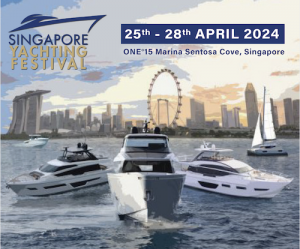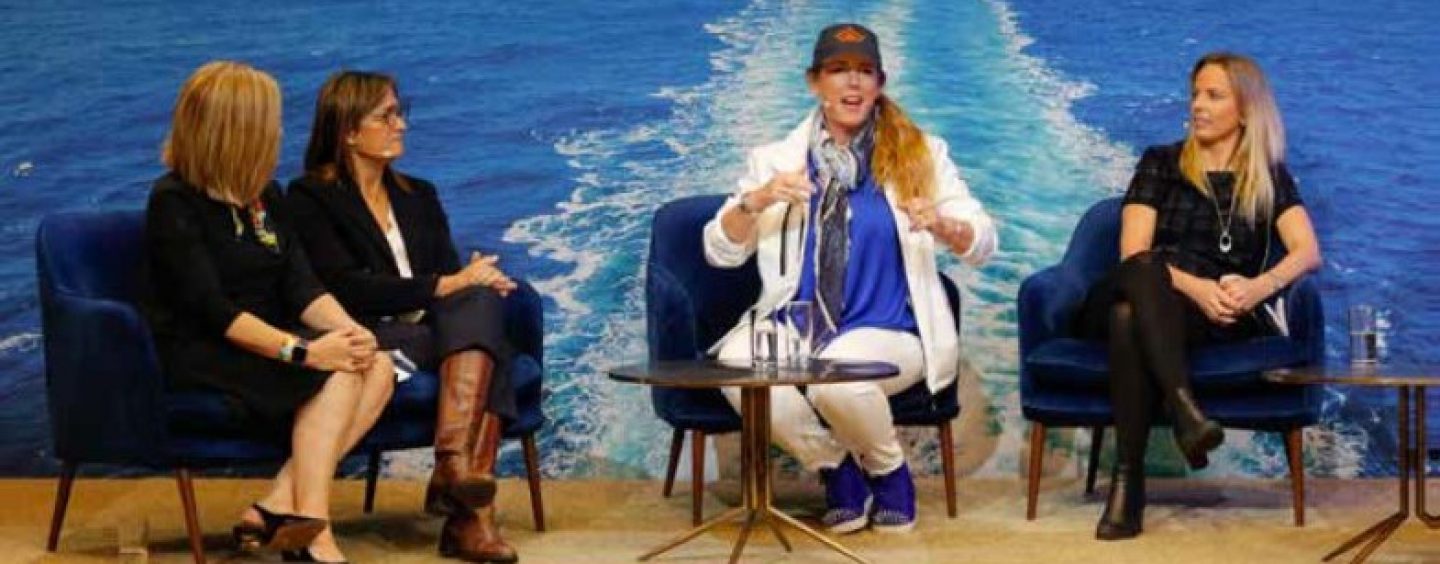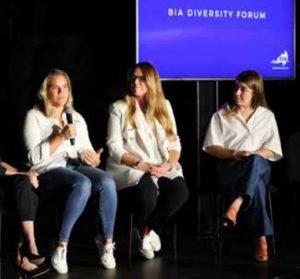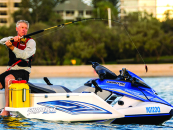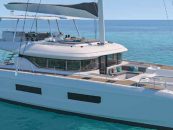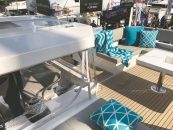Pictured: Nicky Vaux “The Boat Princess” shares her knowledge at
Women in Marine International Network Panel – 2023 METSTRADE
By Roselle Tenefrancia
In the marine world, women leaders over the centuries have had their own share of conquests and warfare. There are many stories of women seafarers, who have been considered as pirates, even if many of them were mainly defending their rights, and protecting their land and their people.
Here are some of the female seafaring leaders in history that not only led their people, but also commanded respect from those who encountered them. (Important note: The following stories were taken from the Royal Museums Greenwich website – rmg.co.uk.)
QUEEN TEUTA OF ILLYRIA (fl. third century BC) was a queen regent of the Ardiaei, a group of Illyrian tribes (based in modern-day Albania, Montenegro, and Bosnia). After the death of her husband, King Agron of the Ardiaei, Teuta ruled in his stead. She was known for supporting the plunder and raids of her subjects on Roman and Greek ships and coastal settlements. When asked to cease her hostile activities by two Roman ambassadors, Teuta is said to have replied: “It was never the custom of royalty to prevent the advantage of its subjects they could get from the sea.”
The two envoys were later imprisoned and executed. Rome declared war on the Ardiaei in 229 BC which ended in her surrender two years later. Rome allowed her to continue ruling but announced that no warship should sail under her command.
AETHELFLAED (c. 870 – 12 June 918) was known as “the Lady of the Mercians” and was the first woman to rule an Anglo-Saxon kingdom. Appearing in the Anglo-Saxon Chronicle, she became the military leader and chief strategist of the Anglo-Saxons after her husband’s death in battle with the Vikings in 911. She is recognised as playing a vital role in defeating the Viking raiders and reconquering English lands lost to Danish pirates.
SAYYIDA AL-HURRA (1485 – 14 July 1561), whose name translates as “Lady who is free and independent”, was a queen of Tetouan (an area of Northern Morocco) in 1515–1542 and known for her pirate activities against the rapidly growing empires of Spain and Portugal. Working alongside Oruc Reis, the governor of Algiers and a known pirate, al-Hurra dominated the Mediterranean Sea while Reis controlled the Eastern. She later also married King Ahmed al-Wattasi of Morocco but was deposed in 1542 by her son-in-law. She lived the remainder of her life in exile.
GRACE O’MALLEY (a. 1530 – 1603) was a formidable Irish pirate and a decisive leader who successfully defended her lands against both English governance and other hostile Irish clans. O’Malley was the daughter of a chieftain and was educated in seafaring by her father. Upon his death, she took to the seas (even giving birth to her first child while aboard a vessel). As the English began occupying Ireland, O’Malley fortified important coastal defences and offered her support to Irish rebels. She even met with Queen Elizabeth I in September 1594 at Greenwich Castle where they created a treaty in Latin.
CHING SHIH (1775–1844) is known as the most successful pirate in history. Beginning life in a Cantonese brothel in the Chinese Empire, Shih later married Zheng Yi, commander of “The Red Fleet,” a fleet of pirate vessels that sailed under a red flag. After the death of her husband, Shih came to amass and rule over history’s largest pirate fleet. Her 1200-strong armada (with a whole crew of over 70,000 men) dominated over the South China Sea, battling domestic and foreign empires (China, Portugal and England) to retain control. Shih is also known for her strict policies and harsh punishments for disobeying orders – from beheadings to cutting off ears. For crimes of rape or unsolicited lootings (something often associated with pirates), the sentence was also death. Seemingly unstoppable, Ching Shih was granted a pardon in later life by the Chinese Emperor, retaining her wealth and opening a profitable gambling den.
These historical narrations of seafaring women obviously tell their stories in the historical periods of imperial invasion. Our societies have somewhat changed over the centuries as we are now in a generally more peaceful period of humanity that is focused on economic and personal progress. But a modern-day Teuta, Aethelflaed, Sayyida, Grace and Ching may be somewhere in our midst, and we just need to open the space for them.
SUPPORTING WOMEN IN THE AUSTRALIAN MARINE INDUSTRY
Despite stories of strong women in history, in the world of our current marine industry, women are still underrepresented or underestimated. The general perception that the marine world is predominantly male-dominated still holds true. This, however, has been changing over the years, with women in the industry who are passionate about boating providing the inspiration for others.
While we mostly see a female face in marketing, sales and advertising roles in the industry, we should also acknowledge that women are also in high level leadership roles. In this day and age, it should not come as a surprise to have women as marine business owners, heads of boards or departments, or holding major decision-making roles. But perhaps, we are still not at that stage quite yet.
“The industry has changed though, and is changing,” says Jess Gatt. “Ten years ago, women would only be in the marketing or sales department. But being a woman in this technical world, I still need to break down barriers. It is very important for everyone to be open to identify what every person can bring to the conversation, regardless of their gender, heritage or cultural background.” With a medical science background, Jess Gatt has established herself in the local and international marine industry, as owner and managing director of Logix Enterprises, specialising in marine consultation and providing corrosion control solutions. She admits though that there is so much more work to do for the industry in the inclusion space.
Picture: As The Boat Princess herself, Nicky Vaux’s mission is to entice
more women into boating and the boating industry.
Jess says that if the industry only listens to the same people with the same ideas, we cannot improve and evolve. “We need diversity of thought in leadership and decision-making. The feminine voice and the feminine energy should be part of that diversity. And this inclusion of diverse voices should be genuine, and based on ability rather than on percentages and ticking boxes.”
Picture: Jess Gatt, managing director at Logix Group speaking
during a thought-provoking panel discussion that shows
the Boating Industry Association’s ongoing commitment to
a more inclusive boating world. (Photo: Salty Dingo)
“Women bring different ways of doing things. We also offer different management styles,” explains Nicky Vaux.
As “The Boat Princess”, she is a passionate advocate for boating and a multiple business entrepreneur.
“There are different ways of boating, and we should make boating accessible to different clients.”
Understanding the changing clientele will also need an understanding of what they want and need, as well as their fears and inhibitions.
“Women are buying boats, and women are taking their children and friends on boats. The ability to successfully address their needs requires a good understanding of the way the female mind works – a feminine mindset,” adds Nicky.
There is a growing interest in boating among the diverse Australian population. Nicky says that the need to be open and accepting of diversity is not limited to gender, but should also apply to everyone regardless of their age, cultural background or heritage.
What can we do to support women in the boating world? Jess says, “Storytelling is important. We have to create neutral spaces in the industry, spaces to introduce people together. The Boating Industry Association (BIA) has shown support by offering better pathways for jobs in the marine industry for women. We should consider the feminine energy as a powerful asset – a caring approach, a different manner, a multidisciplinary way.”
The work culture and language should also evolve to allow women to feel they belong. “We have to work on changing the mindset, by putting the women on the stage at forums, putting women at the helm on the boat,” says Nicky. “We also have to ensure that the men who are working in the industry are standing alongside the women they work with.”
The important role of leadership comes with the primordial ability not just to protect people and improve their lives, but also to nurture people, something that the feminine energy brings. All over the world, we are growing the space for women and the feminine power to take up leadership and decision-making roles – not because we are women, but because we are able and capable humans who happen to be women.
“Women want to earn their leading positions in the industry based on their capacities, not because they are merely included for the sake of diversity.” – Michele Goldsmith, organiser of the Women in Marine International Network Panel at the 2023 METSTRADE.
Picture: BIA hosted a Diversity in Boating forum and fashion show at the
Sydney Boathouse in Rozelle during September 2023. (Photo: Salty Dingo)
Published in print April-June 2024









